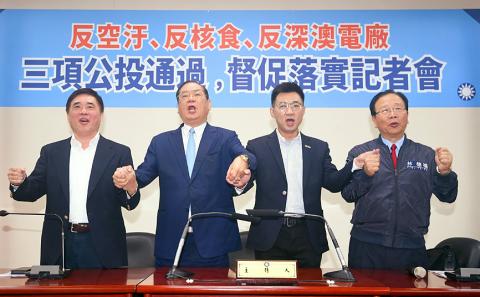The government should start preparing to implement the policies demanded by referendums that passed on Saturday last week, Chinese Nationalist Party (KMT) Vice Chairman and Secretary-General Tseng Yung-chuan (曾永權) said yesterday at an event with sponsors of the KMT-backed referendums.
The party’s politicians proposed referendums on annual cuts to electricity generation at thermal power plants, halting construction or expansion of coal-fired power plants or generators and maintaining a ban on food imports from five Japanese prefectures instituted following the 2011 Fukushima Dai-ichi nuclear power plant disaster.
The three referendums received more “yes” votes than all the ballots cast for KMT candidates in the nine-in-one elections, which showed that the public is interested in the issues, Tseng said.

The KMT would oversee the government, both at the Legislative Yuan and at the local level, to ensure that the referendum results are implemented, Tseng said, adding that the Executive Yuan is responsible for upholding the ban on Japanese food imports.
The referendum is not seeking to restrain Japan, but the Taiwanese government, as the Council of Agriculture and Representative to Japan Frank Hsieh (謝長廷) have been pushing to lift the ban, Tseng said.
KMT Vice Chairman Hau Lung-bin (郝龍斌), initiator of the food ban referendum, said that Taiwan can uphold the ban.
The government has cited a WTO ruling against South Korea’s ban on Japanese food imports in Dispute Settlement 495, but Seoul has continued to enforce the ban, Hau said.
“If South Korea can, so can we,” he said.
KMT Legislator Lin Te-fu (林德福), who initiated the referendum against new coal-fired power plants, said that all referendums supported by the KMT were concerned with people’s health and living standards.
Speaking on behalf of KMT Taichung mayor-elect Lu Shiow-yen (盧秀燕), who proposed the referendum on cutting electricity output from thermal power plants, KMT Policy Committee convener Johnny Chiang (江啟臣) said that it was not a consultation and that the government must take action to realize the results of direct democracy.
“This referendum should not become the most expensive opinion poll [this nation has ever seen],” he said.
Separately yesterday, the Executive Yuan said that it respects the passage of a referendum that asked: Do you agree that subparagraph 1, Article 95 of the Electricity Act (電業法), which reads: “Nuclear-energy-based power-generating facilities shall wholly stop running by 2025,” should be abolished?
However, Executive Yuan spokeswoman Kolas Yotaka said that while the subparagraph has been repealed, the administration’s determination to create a nuclear power-free environment remains unchanged.
Plans to transition to alternative sources of energy would continue as planned, while the government would consider adopting a more flexible energy policy, Kolas said, adding that the goal of a nuclear-free homeland would be realized at a natural and gradual pace.
Additional reporting by Lee Hsin-fang

Taiwan is stepping up plans to create self-sufficient supply chains for combat drones and increase foreign orders from the US to counter China’s numerical superiority, a defense official said on Saturday. Commenting on condition of anonymity, the official said the nation’s armed forces are in agreement with US Admiral Samuel Paparo’s assessment that Taiwan’s military must be prepared to turn the nation’s waters into a “hellscape” for the Chinese People’s Liberation Army (PLA). Paparo, the commander of the US Indo-Pacific Command, reiterated the concept during a Congressional hearing in Washington on Wednesday. He first coined the term in a security conference last

Prosecutors today declined to say who was questioned regarding alleged forgery on petitions to recall Democratic Progressive Party (DPP) legislators, after Chinese-language media earlier reported that members of the Chinese Nationalist Party (KMT) Youth League were brought in for questioning. The Ministry of Justice Investigation Bureau confirmed that two people had been questioned, but did not disclose any further information about the ongoing investigation. KMT Youth League members Lee Hsiao-liang (李孝亮) and Liu Szu-yin (劉思吟) — who are leading the effort to recall DPP caucus chief executive Rosalia Wu (吳思瑤) and Legislator Wu Pei-yi (吳沛憶) — both posted on Facebook saying: “I

A court has approved Kaohsiung prosecutors’ request that two people working for Democratic Progressive Party (DPP) Legislator Lin Dai-hua (林岱樺) be detained, as a probe into two cases allegedly involving her continues. The request was made on Friday, after prosecutors raided Lin’s two offices and the staffers’ residences, and questioned five on suspicion of contravening the Anti-Corruption Act (貪汙治罪條例). The people included the directors of Lin’s Daliao (大寮) and Linyuan (林園) district offices in Kaohsiung, surnamed Chou (周) and Lin (林) respectively, as well as three other staffers. The prosecutors’ move came after they interrogated Lin Dai-hua on Wednesday. She appeared solemn following

Sung Chien-liang (宋建樑), who led efforts to recall Democratic Progressive Party (DPP) Legislator Lee Kun-cheng (李坤城), was released on bail of NT$80,000 today amid outcry over his decision to wear a Nazi armband to questioning the night before. Sung arrived at the New Taipei District Prosecutors’ Office for questioning in a recall petition forgery case last night wearing a red armband bearing a swastika, carrying a copy of Adolf Hitler’s Mein Kampf and giving a Nazi salute. Sung left the building at 1:15am without the armband and covering the book with his coat. Lee said today that this is a serious